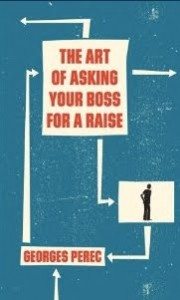David Bellos spoke at NYU’s Maison Française last night, presenting his new translation of Georges Perec’s The Art of Asking Your Boss for a Raise. This book is a variation on what Bellos explained is now generally called matrix literature, stories based on allowing readers to select certain plot strands and ignore others à la choose your own adventure books. But in this case, rather than excluding the rejected possibilities, Perec includes all of them, detailing the various choices the book’s protagonist (addressed in the second person passim) might make and then describing what will happen in each case. Where Raymond Queneau’s approach to the matrix story in “Conte a votre façon” (A Story As You  Like It) might be described as “intellectual” (says Bellos, and I agree), Perec’s is “obsessive” and “exhaustive.”
Like It) might be described as “intellectual” (says Bellos, and I agree), Perec’s is “obsessive” and “exhaustive.”
In the course of discussing Perec, Bellos said some interesting things about language in translation, quipping that “English isn’t a language, it’s a big mess” – because there are so many versions of the English language spoken all over the globe. So in what language does he, a U.K. native living in the U.S., write his translations? Well, he writes them in British English, and then an American editor “de-Brits” them, removing all the expressions that are likely to be either misunderstood or flat-out incomprehensible to an American reader. The result is what Bellos has dubbed “Tranglish” – an “almost invisible” language that “offends nobody.” There are certain pairs of words that simply are what they are, either American or British (e.g.  elevator/lift, sidewalk/pavement, trunk/boot), but in many cases, Bellos says, it is possible to avoid using the actual vocabulary items that attach the work to a particular continent. I too try to achieve something like this in my translations, which are often co-published in London at the same time as they appear in New York: I look up the words I use in the Oxford English Dictionary and eliminate any that are marked “U.S. usage only.” Many words that first appeared in the U.S. do eventually come into regular use in the U.K., though, and words of this sort are fine for translation purposes, in my opinion. Bellos does use one word not found in any dictionary, however, though he is convinced it does exist, since his Latin teacher liked to use it: “circumperambulate,” appearing here as a translation of “faire la tour de.” I like it.
elevator/lift, sidewalk/pavement, trunk/boot), but in many cases, Bellos says, it is possible to avoid using the actual vocabulary items that attach the work to a particular continent. I too try to achieve something like this in my translations, which are often co-published in London at the same time as they appear in New York: I look up the words I use in the Oxford English Dictionary and eliminate any that are marked “U.S. usage only.” Many words that first appeared in the U.S. do eventually come into regular use in the U.K., though, and words of this sort are fine for translation purposes, in my opinion. Bellos does use one word not found in any dictionary, however, though he is convinced it does exist, since his Latin teacher liked to use it: “circumperambulate,” appearing here as a translation of “faire la tour de.” I like it.
Bellos also passed on an interesting bit of insider gossip for readers of Perec’s masterpiece La vie: mode d’emploi, which appears in his translation as Life: A User’s Manual: the answers to many of the mysteries in this book are contained only in the index, and the index of the English-language book contains several more answers than the French original. Bellos felt that certain of the clues Perec included elsewhere in the book became so much more obscure in English translation that the reader deserved a second chance to find them.
Would you like to play the Art of Asking Your Boss for a Raise game? If the answer is yes, click here.


Interesting post!